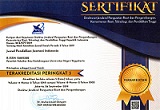Kontribusi filosofi dan kompetensi pedagogi terhadap kualitas mengajar guru pendidikan jasmani di sekolah dasar
Downloads
Penelitian ini bertujuan untuk mengetahui seberapa besar kontribusi filosofi dan kompetensi pedagogi terhadap kualitas mengajar guru pendidikan jasmani. Metode penelitian deskriptif kuantitatif dengan instrumen angket tentang filosofi dan kompetensi pedagogi guru pendidikan jasmani. Sampel dalam penelitian ini adalah 50 guru pendidikan jasmani dengan Proporsional Random Sampling. Hasil Penelitian menunjukkan bahwa Kontribusi filosofi guru pendidikan jasmani di 5 kabupaten/kota di Daerah Istimewa Yogyakarta dalam kategori Cukup sebesar 18 % atau sejumlah 36 orang dan katagori Tinggi 64% sejumlah 32 orang; Kontribusi Kompetensi Pedagogik guru pendidikan jasmani di 5 kabupaten/kota di Daerah Istimewa Yogyakarta dalam kategori Cukup, sebesar 48 % atau sejumlah 24 orang dan katagori Tinggi 52% sejumlah 26 orang. Kedua variabel berkontribusi besar terhadap kualitas mengajar guru pendidikan jasmani di Sekolah Dasar sehingga guru pendidikan jasmani hendaknya terus mengembangkan filosofi dan kompetensi pedagoginya untuk meningkatkan kualitas pembelajaran.
Contribution of philosophy and pedagogical competence to the quality of teaching physical education teachers in primary schools
Abstract
This study aims to determine how much the contribution of philosophy and pedagogical competence to the quality of teaching physical education teachers. Descriptive quantitative research methods with a questionnaire about the philosophy and competence of physical education teacher pedagogy. The sample in this study were 50 physical education teachers with Proportional Random Sampling. The results showed that the contribution of the philosophy of physical education teachers in 5 districts in the Special Region of Yogyakarta in the Fair category was 18% or 36 people and High category 64% 32 people; Contribution of Pedagogical Competencies of physical education teachers in 5 regencies in the Special Region of Yogyakarta in the Fair category, amounting to 48% or a number of 24 people and the category of Higher 52% totaling 26 people. These two variables contribute greatly to the quality of teaching physical education teachers in elementary schools so that physical education teachers should continue to develop their pedagogical philosophies and competencies to improve the quality of learning.
Downloads
Bohari, L. (2014). Faktor pendukung guru-guru dalam mewujudkan kinerjanya yang professional. Artikel. Dimuat di Kompasiana.com.
Dzulkifli & Sari, I.P. (2015). Karakteristik Guru Ideal. UNAIR: Seminar Psikologi dan Kemanusiaan. Hasil Penelitian. ISBN: 978-979-796-324-8.
Erbas, M.K. (2013). Determination of physical education teachers' educational beliefs. International Journal of Academic Research Part B; 2013; 5(5), 386-392. DOI: 10.7813/2075-4124.2013/5-5/B.60.
Gamboa, J.O.H; Rivera, J.L.V; & Parra, A.J.O. (2019). The pedagogical competences and their importance in virtual physical education. Journal of Physics: Conference Series. Doi:10.1088/1742-6596/1161/1/012009.
Goucha, M. (2007). Philosophy a School of Fredoom: Teaching Philosophy and Learning Philosophize (status and prospect). UNESCO.
Green, K. (2000). Exploring the Everyday 'Philosophies' of Physical Education Teachers from a Sociological Perspective. Sport, Education and Society, 5:2, 109-129, DOI: 10.1080/713696029.
Kovac, M; Sloan, S; & Starc, G. (2009). Competencies in physical education teaching: Slovenian teachers' views and future perspectives. European Physical Education Review. DOI: 10.1177/1356336X08095668.
McNamee. (2004). The Nature and Values of Physical Education. Physical Education: Essensial Issues. Sage Publication.
Mutohir, T. (2002). Gagasan-gagasan tentang Pendidikan Jasmani dan Olahraga. Unesa University Press: Surabaya.
Pelton. (1970). New curriculum perspectives. Dubuque, IO: Brown Publishers.
Roberto, et al. (2016). Factors that Influence the Teaching-Learning Process from the Perspective of Accountancy Students: Analysis at a Higher Education Institution in Minas Gerais. REPeC – Revista de Educaí§í£o e Pesquisa em Contabilidade, ISSN 1981-8610, Brasília, v.10, n. 2, art. 5, p. 192-215.
Pueyo, A.P; Alcala, D.H; Garijo, A.H; & Gallegos, A.G. (2020). The Attitudinal Style as a Pedagogical Model in Physical Education: Analysis of Its E_ects on Initial Teacher Training. International Journal of Environmental Research and Public Health. DOI:10.3390/ijerph17082816.
Saputro, AY. (2018). Kompetensi guru pendidikan jasmani SMA bersertifikasi tahun 2009-2010 dalam pembelajaran pendidikan jasmani. Jurnal Pendidikan Jasmani Indonesia (JPJI), 14 (2), 2018, 69-83.
Shimon, J.M. (2020). Introduction to teaching physical education. USA: Human Kinetics.
Shulman. (1987). Knowledge and Teaching: Foundations of the New Reform. Harvard Educational Review: Vol. 57, No. 1, pp. 1-23.
Stadtherr, T. (2005). Philosophy of Physical Education. Paper.
Sujarwo. (2019). Profil guru pendidikan jasmani olahraga dan kesehatan. Artikel. Program Pengabdian kepada Masyarakat.
Turkeli, A, & Senel, O. (2016). Physical education teacher's attitudes towards philosophy of education and technology. Educational Research and Reviews. Vol. 11(15), pp. 1351-1354. DOI: 10.5897/ERR2016.2753.
UNY Community. (2019). Daya tampung dan peminat SBMPTN UNY 2019. https://unycommunity.com/daya-tampung-dan-peminat-sbmptn-universitas-negeri-yogyakarta-2019/.
Usman, M.U. (2010). Menjadi Guru Profesional edisi kedua. Bandung: Remaja Rosdakarya.

Jurnal Pendidikan Jasmani Indonesia is licensed under a Creative Commons Attribution-ShareAlike 4.0 International License.
Based on a work at https://journal.uny.ac.id/index.php/jpji.











